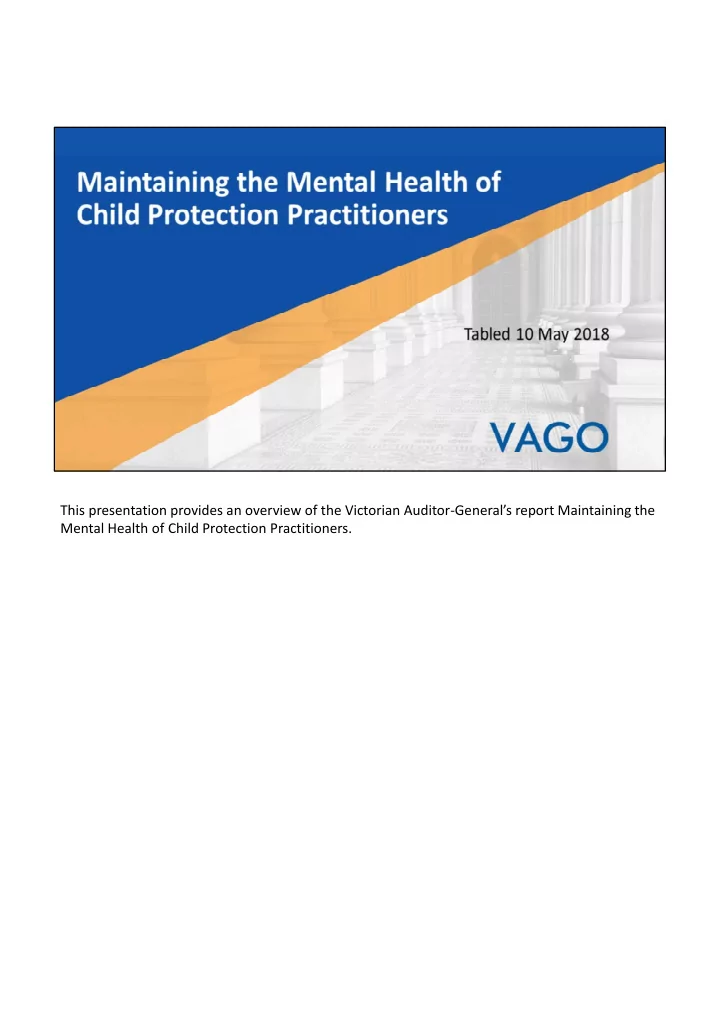

This presentation provides an overview of the Victorian Auditor ‐ General’s report Maintaining the Mental Health of Child Protection Practitioners.
Child protection practitioners, or CPPs, receive, and investigate reports of suspected child abuse and neglect—and where necessary, provide protective services to children. Like police and emergency services, CPPs are exposed to mental and emotional stress due to the nature of their work, which includes: difficult and sometimes hostile interactions • long and unpredictable working hours, and • traumatic incidents, including death. •
We looked at the Department of Health and Human Services (or DHHS) because it has a duty of care to CPPs under the Occupational Health and Safety Act (OHS Act). Under the Act, DHHS must provide (so far as is reasonably practical) a safe working environment that is without risks to employee health—including mental health. We also examined WorkSafe Victoria’s role in monitoring and enforcing compliance with the OHS Act, relevant to mental health.
Our audit objective was to determine whether CPPs are maintaining good mental health. We examined whether DHHS: promotes mental health and prevents mental illness, and • identifies and appropriately manages potential and existing mental health issues. •
CPPs struggle to maintain good mental health. CPPs face a lack of organisational support for mental health management, rising stress levels, persistent high turnover and inadequate work–life balance caused by unrealistic work demands. Their good mental health is also threatened by a lack of professional respect that feeds inappropriate behaviour towards CPPs. DHHS‘s CPP Workforce Strategy, if properly implemented, will be a positive step in addressing the secondary risks to CPPs’ mental health. However, it will not be enough unless the primary issue affecting CPP mental health—unreasonable workloads—is addressed.
The primary risk to CPPs’ mental health is unreasonable workloads. CPPs have faced excessive workloads for some time, and CPPs repeatedly report feeling that meeting workload requirements comes at the cost of their mental health. DHHS estimates that the CPP workforce needs to double in size for workloads to return to sustainable levels.
A key secondary risk to CPPs’ mental health is a lack of professional respect for the child protection profession. CPPs report frequent hostile behaviour by clients, professionals and others in court environments and workplaces. We found that hostility toward CPPs has become so widespread that it is now normalised.
A second set of secondary risks stem from: poorly designed support tools • inconsistent guidance and provision of support—and • disincentives to accessing support. • DHHS has a range of supports for CPPs, which is a positive approach, but we found that CPPs do not always know that these supports are available or which one to use. Further, DHHS does not collate and analyse the data from the supports—and so does not have an informed understanding of CPPs’ mental health. We also found that fears of being labelled as incapable can make CPPs reluctant to use the supports, or take accrued leave—and that they report fatigue ‐ driven absences from work as being due to illness or physical injury.
DHHS has committed to improve its support for CPP mental health. This includes implementing a CPP Workforce Strategy. Many of the initiatives in the strategy aim to address the secondary mental health risks identified. However, without more CPPs to reduce workloads, it will not be enough to alleviate the pressure on CPPs.
We made seven recommendations for DHHS that focus on ensuring that: government is more aware of the risks to CPPs’ mental health from exposure to unreasonable • workloads—and the resources needed to resolve this issue DHHS has a holistic view of CPP mental health and consistently provides specialist support • CPPs know what support is available and how to raise mental health concerns—and • that action is taken to improve CPPs’ experiences in the court environment. • All recommendations have been accepted.
For further information, please see the full report of this audit on our website, www.audit.vic.gov.au.
Recommend
More recommend